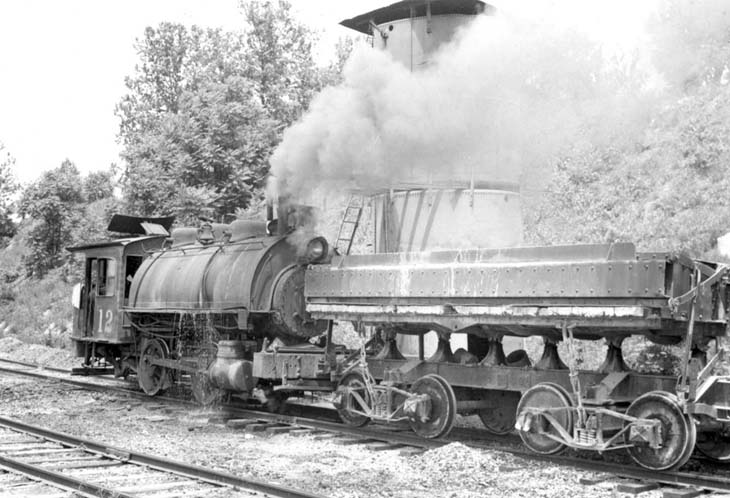
Click to enlarge.
Marble Cliff Quarry saddle tank locomotive No. 12 taking on water, June, 1956.
The Marble Cliff Quarry was located adjacent to the village of Marble Cliff.
It is an example of a local business using their own steam locomotives to move railroad cars around their property.
Photo by Galen Gonser
There was a time, in the 19th and 20th Century, when Columbus was a manufacturing town. A special section in a 1910 addition of the Columbus Dispatch estimated that there were 600 factories in the city. The U.S. census department defined a factory "as a place where things were made and some power - steam, electric, etc was used in making them". In that special newspaper addition over 300 products made in Columbus were listed. (Click here for the list.)
Supplying the factories and moving the finished products was big business for the railroads. Columbus was honey combed with railroad sidings serving those factories. Some facilities were large enough to have their own tracks, small rail yard and locomotives. Two quarry operations, American Aggregates and Marble Cliff Quarry are examples. Buckeye Steel Castings, Jeffery Manufacturing, and the Ralston Steel Car Co. also had small rail operations. Ohio State University had a small rail yard at their campus power plant and used a crane to move the coal cars. The US Army's General Depot on Columbus' east side had its own rail operation with steam locomotives. During WW II Curtis Wright near the airport had its own power plant and a small diesel to move coal cars around. Two power plants near Columbus, Big Walnut and the Pickway used fireless steam and electric locomotives to move coal cars.
The railroads were also consumers of those Columbus made products. Columbus Steel Castings on the south side made trucks, wheels, couplers and other heavy cast products for railroad cars. The Ralston Steel Car Co. made freight cars of all kinds. Timken Roller Bearing made the roller bearings used in railroad cars and locomotives. Jeffery Manufacturing besides making mine equipment made conveyors and other coal handling apparatus for railroads. National Electric Coil Co. repaired traction motors. Kilbourne & Jacobs Manufacturing made mine cars and Fritz-Rumer-Cooke, a construction company, prepared right-of-way and constructed track. In the 19th century the Gill Car works build railroad freight cars and the Columbus Bridge Company supplied some of the bridges used by the railroads in Columbus.
This is only a sample of the local industries that supported the railroad industry. This section of columbusrailroads.com will look at some of those industries.
Supplying the factories and moving the finished products was big business for the railroads. Columbus was honey combed with railroad sidings serving those factories. Some facilities were large enough to have their own tracks, small rail yard and locomotives. Two quarry operations, American Aggregates and Marble Cliff Quarry are examples. Buckeye Steel Castings, Jeffery Manufacturing, and the Ralston Steel Car Co. also had small rail operations. Ohio State University had a small rail yard at their campus power plant and used a crane to move the coal cars. The US Army's General Depot on Columbus' east side had its own rail operation with steam locomotives. During WW II Curtis Wright near the airport had its own power plant and a small diesel to move coal cars around. Two power plants near Columbus, Big Walnut and the Pickway used fireless steam and electric locomotives to move coal cars.
The railroads were also consumers of those Columbus made products. Columbus Steel Castings on the south side made trucks, wheels, couplers and other heavy cast products for railroad cars. The Ralston Steel Car Co. made freight cars of all kinds. Timken Roller Bearing made the roller bearings used in railroad cars and locomotives. Jeffery Manufacturing besides making mine equipment made conveyors and other coal handling apparatus for railroads. National Electric Coil Co. repaired traction motors. Kilbourne & Jacobs Manufacturing made mine cars and Fritz-Rumer-Cooke, a construction company, prepared right-of-way and constructed track. In the 19th century the Gill Car works build railroad freight cars and the Columbus Bridge Company supplied some of the bridges used by the railroads in Columbus.
This is only a sample of the local industries that supported the railroad industry. This section of columbusrailroads.com will look at some of those industries.